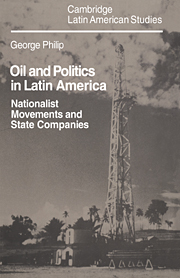Book contents
- Frontmatter
- Contents
- List of tables
- Preface
- Glossary
- Abbreviations
- Note on currencies and other units of measurement
- Maps: Latin America in 1920, 1940, 1960 and 1981; showing importing countries, exporting countries and countries self-sufficient in oil
- Introduction: The politics of oil in twentieth-century Latin America
- Part I The world oil environment
- 1 The corporate ascendancy 1890–1927
- 2 Retrenchment and concentration 1928–41
- 3 The making of the post-war oil world 1942–55
- 4 The major companies in retreat 1955–70
- 5 The oil market revolution and its consequences for Latin America 1971–9
- 6 Latin America in the twentieth-century oil system
- Part II The major expropriations
- Part III The state oil companies
- Notes and bibliography
- Index
- CAMBRIDGE LATIN AMERICAN STUDIES
6 - Latin America in the twentieth-century oil system
Published online by Cambridge University Press: 23 December 2009
- Frontmatter
- Contents
- List of tables
- Preface
- Glossary
- Abbreviations
- Note on currencies and other units of measurement
- Maps: Latin America in 1920, 1940, 1960 and 1981; showing importing countries, exporting countries and countries self-sufficient in oil
- Introduction: The politics of oil in twentieth-century Latin America
- Part I The world oil environment
- 1 The corporate ascendancy 1890–1927
- 2 Retrenchment and concentration 1928–41
- 3 The making of the post-war oil world 1942–55
- 4 The major companies in retreat 1955–70
- 5 The oil market revolution and its consequences for Latin America 1971–9
- 6 Latin America in the twentieth-century oil system
- Part II The major expropriations
- Part III The state oil companies
- Notes and bibliography
- Index
- CAMBRIDGE LATIN AMERICAN STUDIES
Summary
There are, broadly speaking, two ways in which the international oil system can be analysed. One of these is essentially derived from liberal economic theories and stresses the importance of factor endowments and comparative costs in explaining international trade. The other is basically Marxist (although shared by some conservatives) and argues that trade, even where it does not follow the flag, is nevertheless mainly determined by international power relationships. Now that evidence has been presented, it may be interesting to consider how these different approaches can be applied to the oil system in the twentieth century.
To begin with the first approach, it is certainly true that the history of international oil has been made up in large part by such environmental factors as the international distribution of population and potentially oil-bearing territory. Moreover, policy can very often be understood in terms of these factors. Let us therefore consider the geological conditions that have existed in Latin America during the course of the century and their effect upon policy.
Two Latin American countries, Venezuela and Mexico, have been actually or potentially oil rich during most of the century in the sense that there was not only enough oil to be found and exported on a large scale but also adequate technology for the purpose as well as geological conditions which made these sources relatively low cost.
- Type
- Chapter
- Information
- Oil and Politics in Latin AmericaNationalist Movements and State Companies, pp. 144 - 156Publisher: Cambridge University PressPrint publication year: 1982



